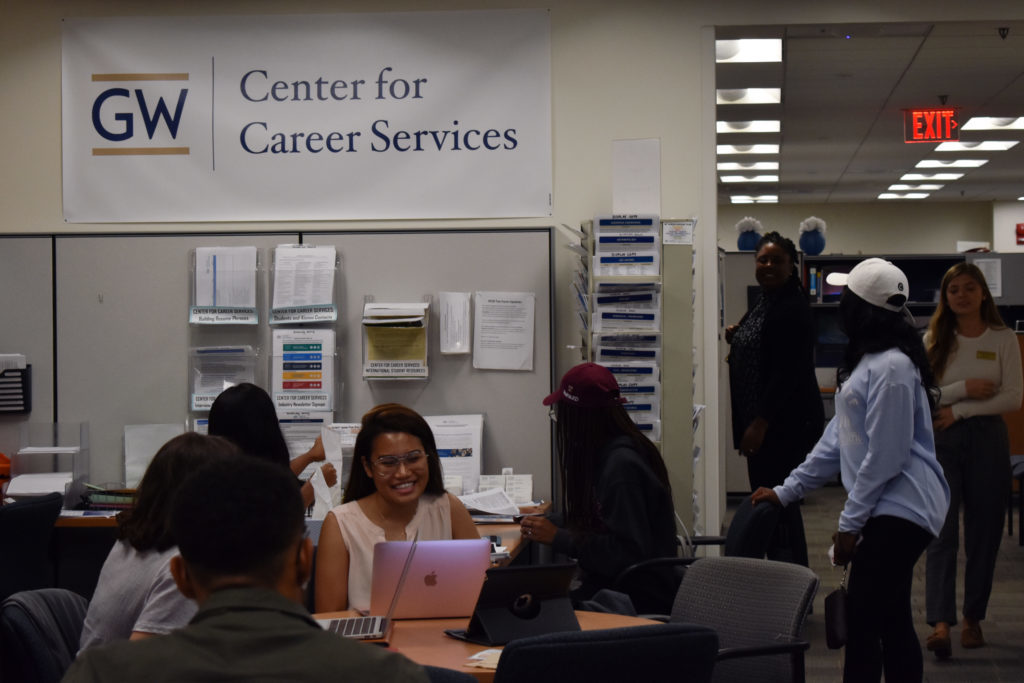GW is one of its own graduates’ top employers.
The University is listed as one of its alumni’s top employers on a U.S. News and World Report list of 17 companies that most often hire GW alumni. In interviews, more than 10 alumni who are previous or current University employees said they chose to return to GW to give back to their alma mater and because they already have institutional knowledge, giving them a leg up in their day-to-day work.
The 16 other companies that most frequently hire GW graduates include places like the U.S. Department of Justice and Politico, according to U.S. News and World Report. Four of the University’s 12 peer institutions, including Tulane University and the University of Pittsburgh, are also ranked as a top employer of their own graduates.
Rachel Brown, the assistant provost for University Career Services, said more than 50 graduating seniors indicated they were working at the University six months after graduation for the classes of 2015, 2016 and 2017. Brown said alumni may return to the University to work because they want to begin pursuing a graduate degree and work at GW at the same time.
She said some recent graduates pursue jobs at GW as research assistants, program assistants, program or project coordinators, information administrators or operations coordinators. Employees also benefit from working at the University because they can receive tuition benefits and “the potential for flexible schedules,” Brown said.
“Their familiarity with the University, the culture and systems may help them ‘hit the ground running’ and be an advantage for the individual employee as well as the university,” Brown said in an email.
University spokeswoman Maralee Csellar said there are “hundreds” of GW employees who graduated from the University with bachelor’s, master’s or doctoral degrees. While some alumni return to GW immediately after graduation, other graduates begin their career and return to campus to teach or conduct research, she said.
“Many GW alumni return to campus to be able to give back to students in similar ways to when their mentors helped them as they started out in their own careers,” she said in an email.
Alumni who work at GW said they chose to work at GW after trying out previous jobs or because they wanted to return to GW to pursue a graduate degree, which they could also fund by working for the University.
Alumna Jordana Cole, who graduated in 2003, returned to GW in 2006 as an academic adviser in the University Honors Program after realizing that she “had a passion for helping students grow and succeed.” She said “it made sense” to work at her alma mater because she could help students navigate “familiar territory” in an advisory role instead of a student.
“I knew what their lives were like as students and could speak their language,” she said. “I knew the campus, the curriculum, student orgs, lingo and slang, trends, inside jokes. I knew what life was like for a GW student because I had been one myself not that long before.”
Cole left the University in 2010 to find work with a shorter commute, she said.
Alumnus Aria Varasteh, who graduated in 2012, said he went back to GW in 2013 to work as a data analyst because he could obtain a graduate degree under GW’s “tuition remission” program, which covers 90 percent of an employee’s tuition for a graduate program. Varasteh said because he served as the vice president for student activities in the Student Association during his time as an undergraduate, he already knew officials and alumni working at the University, making his transition easier.
Varasteh said he left his University job in July 2017, three weeks after his graduate program ended, to pursue another job.
“I fell in love with the people I had befriended in D.C., I fell in love with the city and the people have been great, so I thought, ‘Why don’t I hang around D.C. a while longer?’” he said.
Career services experts said a high number of alumni could return to their alma mater for work because alumni are likely to live in an urban setting like D.C. Nearly 40 percent of recent alumni stay in the District after graduation.
Lori Shreve Blake, the senior director of alumni and student career services center at the University of Southern California, said because alumni already stay in D.C., graduates may have more incentive to return to GW because the school is in the area where they’re living and seeking a job.
“If you are in small little college and that’s all there is a college maybe those people don’t retain them as much those colleges,” Blake said. “If there’s a big metropolitan city, then I think they have more of a chance because people aren’t going to leave.”
Maria Stein, the associate vice president of employer engagement and career design at Northeastern University, said alumni living near GW who want to pursue an additional graduate degree could also return to GW to work because they’ll also benefit from a cheaper graduate program.
She added that alumni could go back to work for departments like admissions or career services because they have experiential knowledge of an institution as a former student.
“A young alum might actually be very beneficial because they’re close enough to having recently gone through that experience that they give a very different perspective to prospective students,” she said. “From alumni relations, having someone who’s an alum might often make it easier to connect because of that shared experience.”
Sarah Roach contributed reporting.





